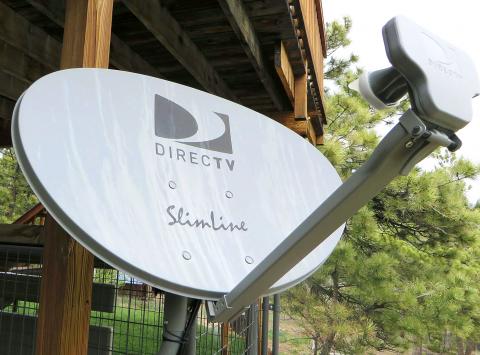AT&T Inc plans to pay US$48.5 billion to buy DirecTV Group, in the latest sign that the wireless industry and the US television market are set to converge as customers consume more video on their mobile devices.
The deal, announced on Sunday, highlights AT&T’s pressing need for fresh avenues of growth beyond the maturing US cellular business, which has become increasingly competitive.
Consumer advocates are already putting pressure on US regulators to reject the deal.

Photo: Reuters
“You can’t justify AT&T buying DirecTV by pointing at Comcast’s grab for Time Warner, because neither one is a good deal for consumers,” said Delara Derakhshani, policy counsel for the Consumers Union, the advocacy arm of Consumer Reports.
The combination with DirecTV, the No. 1 US satellite TV provider with 20 million customers, would beef up Dallas-based AT&T’s packages of cellular, broadband, TV and fixed-line phone services.
For DirecTV, the deal would enable it to offer broadband Internet for the first time to its US customers, filling a gap that had made the company vulnerable to cable rivals, which can provide an Internet service through their networks.
“It gives us the parts to fulfill a vision we have had for a couple of years, that is, the opportunity and the ability to take premium content and deliver premium content over multiple points for the customer, whether it be through a smartphone, through a tablet, or television or laptop,” AT&T chief executive Randall Stephenson said during a conference call.
Stephenson’s counterpart at DirecTV, Mike White, is to stay on to run the satellite television business, which is to remain based outside Los Angeles in El Segundo, California.
AT&T offers a video service known as U-Verse. Stephenson said during a conference call that the company would continue to offer it after the acquisition is completed. It expects the deal to close in about a year.
AT&T and DirecTV made their announcement just a few months after Comcast Corp offered US$45 billion for Time Warner Cable Inc, a transaction that would create the leading US cable and broadband Internet provider. The Comcast proposal is pursuing regulatory approval.
AT&T is offering US$95 per DirecTV share in a combination of stock and cash, a 10 percent premium over Friday’s closing price of US$86.18. It plans to finance the cash portion, US$28.50 per share, with funds on hand, asset sales and financing already lined up, it said.
The transaction has a total value of US$67.1 billion, including the assumption of DirecTV’s net debt.
To help its case with regulators, AT&T said it would sell its 8 percent stake in Carlos Slim’s America Movil, worth about US$5 billion. DirecTV has about 18 million customers throughout Latin America.
AT&T said it expected to be able to add 15 million broadband customers, mostly in rural areas, within four years of the deal closing, adding to its base of 11 million Internet customers.
The latest deal will immediately ratchet up the pressure on competitors. In particular, it raises questions about the No. 2 satellite TV operator, Dish Network, and what it might do. With 14 million subscribers, Dish trails DirecTV and has spent billions for wireless spectrum it has yet to use.

Taiwan would remain in the same international network for carrying out cross-border payments and would not be marginalized on the world stage, despite jostling among international powers, central bank Governor Yang Chin-long (楊金龍) said yesterday. Yang made the remarks during a speech at an annual event organized by Financial Information Service Co (財金資訊), which oversees Taiwan’s banking, payment and settlement systems. “The US dollar will remain the world’s major cross-border payment tool, given its high liquidity, legality and safe-haven status,” Yang said. Russia is pushing for a new cross-border payment system and highlighted the issue during a BRICS summit in October. The existing system

Taiwan Semiconductor Manufacturing Co (TSMC, 台積電) is expected to grow its revenue by about 25 percent to a new record high next year, driven by robust demand for advanced technologies used in artificial intelligence (AI) applications and crypto mining, International Data Corp (IDC) said yesterday. That would see TSMC secure a 67 percent share of the world’s foundry market next year, from 64 percent this year, IDC senior semiconductor research manager Galen Zeng (曾冠瑋) predicted. In the broader foundry definition, TSMC would see its market share rise to 36 percent next year from 33 percent this year, he said. To address concerns

Intel Corp chief financial officer Dave Zinsner said that a formal separation of the company’s factory and product development divisions is an open question that would be decided by the chipmaker’s next leader. Zinsner, who is serving as interim co-CEO following this month’s ouster of Pat Gelsinger, made the remarks on Thursday at the Barclays technology conference in San Francisco alongside co-CEO Michelle Johnston Holthaus. Intel’s struggles to keep pace with rivals — along with its deteriorating financial condition — have spurred speculation that the next CEO would make dramatic changes. That has included talk of a split of the company’s manufacturing

PROTECTIONISM: The tariffs would go into effect on Jan. 1 and are meant to protect the US’ clean energy sector from unfair Chinese practices, the US trade chief said US President Joe Biden’s administration plans to raise tariffs on solar wafers, polysilicon and some tungsten products from China to protect US clean energy businesses. The notice from the Office of US Trade Representative (USTR) said tariffs on Chinese-made solar wafers and polysilicon would rise to 50 percent from 25 percent and duties on certain tungsten products would increase from zero to 25 percent, effective on Jan. 1, following a review of Chinese trade practices under Section 301 of the US Trade Act of 1974. The decision followed a public comment period after the USTR said in September that it was considering